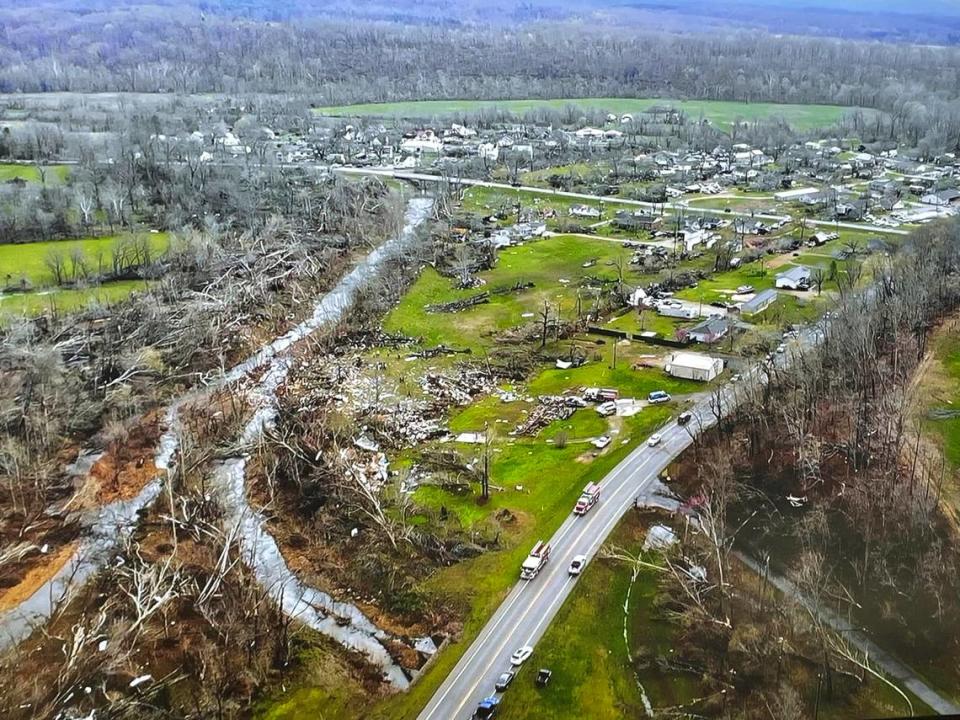Can a neighbor film you with a drone camera? Can the police? What Missouri laws say
With warm weather and clear skies arriving in Kansas City, you may hear a faint buzz in the air when you step outside.
That’s not just summer insects arriving in the metro: Hobbyist drone pilots are also heading outdoors to practice their skills and get sweeping aerial photos and videos of their surroundings.
Remote-controlled drones straddle the line between private and public life. While some recreational flyers simply use their drones for nature photography or home videos, drones can also be deployed by private companies, media outlets and even the police.
So what happens when a drone camera records you, potentially without your consent? Here are the laws governing drones in Missouri, and what privacy rights you have in the state.
Where can you legally fly a drone in Missouri?
There are only three types of places where you aren’t allowed to fly a drone in Missouri without permission: over a prison, a mental hospital or an “open-air facility” like a sports stadium or concert venue.
While state law only restricts flying less than 400 feet above these areas, federal regulations prohibit most civilian drone pilots from flying higher than 400 feet anywhere. That means these three locations are basically off-limits to Missouri’s recreational drones.
You’re also not allowed to let your drone make contact with any of the people inside these facilities.
Breaking these laws is considered an infraction — a noncriminal offense similar to a misdemeanor— unless your drone is used to deliver dangerous items like weapons or controlled substances to people inside. These types of deliveries are felonies under Missouri law.
Kansas City’s code of ordinances doesn’t place any additional restrictions or guidelines on drone use specifically, although it does prohibit obstructing airspace at city airports.
Are government and police drones subject to the same restrictions?
Missouri’s drone laws carve out numerous exceptions for who can fly drones over restricted areas. They include people with written permission, employees of the facilities, and government or law enforcement agents conducting “official duties.”
The Kansas City Police Department’s drone use policy document authorizes officers to use drones for documentation, surveillance, search and rescue, apprehending suspects and other uses. It also states an intention to respect the privacy of those unrelated to an ongoing law enforcement case.
“Operators and observers will take reasonable precautions to avoid inadvertently recording or transmitting images of areas where there is a reasonable expectation of privacy,” the policy reads.
Officers are also barred from using drone technology to conduct random surveillance, for personal business unrelated to work, to target a person based on profiling, or “to harass, intimidate or discriminate against any individual or group.”
However, these internal department policies don’t carry the same weight as law, making the punishments for violating them less clear.

Is it legal to record people using a drone in Missouri?
Missouri has laws about recording people without their consent in private spaces, but they don’t extend to many drone uses.
For instance, recording audio of a conversation between people without either of their permission violates Missouri’s wiretapping law. But taking a photo or video of someone outdoors — even if they’re on their own property — isn’t forbidden.
Missouri’s right to privacy law is narrowly focused on taking intimate photos or recordings of people without their consent. Other types of recordings aren’t mentioned, including those taken on private property.
This leniency applies to law enforcement and government officials, too. Currently, police can fly a drone on private property to collect information related to a case without a warrant.
Missouri legislators have made several attempts to pass a bill that would greatly restrict drone pilots’ ability to record people.
The “Preserving Freedom from Unwarranted Surveillance Act‘‘ would require subjects’ permission to record them using a drone and property owners’ permission before flying or recording on their property. It would also require police to obtain a warrant before using drones for surveillance.
The bill was passed by the Missouri House of Representatives’ Special Committee on Homeland Security in February, but it is not scheduled for a vote in the broader chamber. That most likely means it won’t be considered this year.
Do you have questions about your privacy rights in Missouri or Kansas? Ask the Service Journalism team at kcq@kcstar.com.


